Jobs in Japan for Filipinos 2025
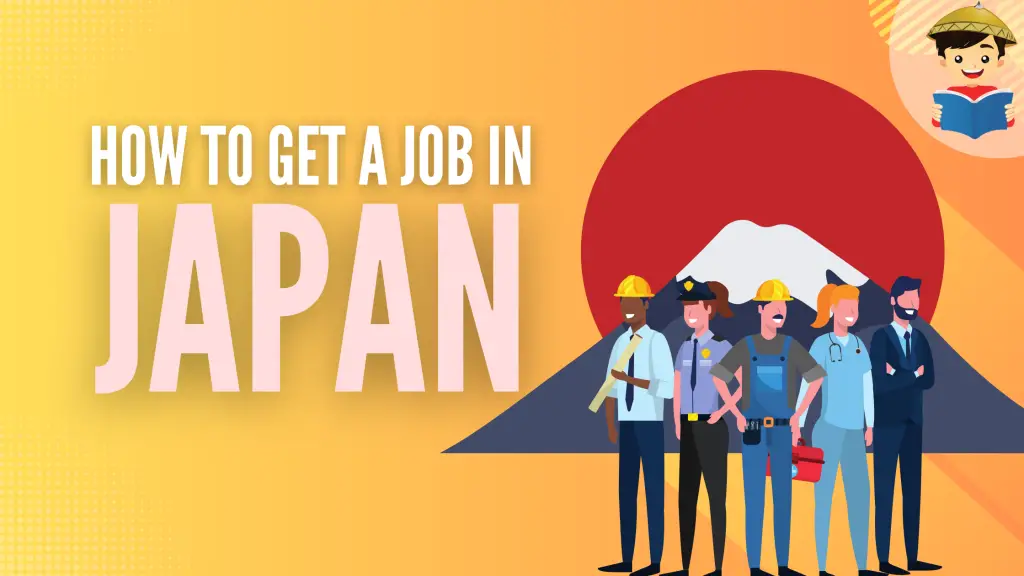
It’s no secret that Japan is a popular destination for Filipinos who want to travel. But what about Filipinos who want to work?
According to data from the Philippine Overseas Labor Office (POLO) in Tokyo, Japan, the number of Filipinos has grown from 216,9914 in 2012 to 277,4095 in 2021. Filipinos are the 4th biggest group in Japan’s foreign population6 according to a 2020 report by the Japanese Ministry of Justice.
This number may increase further as the Tokyo POLO reported that 350,000 jobs are available for migrant workers7 as part of the Specified Skills Workers (SSW) program announced in 2019.
If you hope to work in Japan yourself, it’s crucial to understand how the hiring process through POEA-accredited agencies works. This way, you’ll give yourself the highest chance of getting hired.
Table of Contents
Top 10 Most In-Demand Jobs in Japan for Filipinos
POEA, or the Philippine Overseas Employment Agency (now the DMW or the Department of Migrant Workers), accredits foreign employers and local recruitment agencies. They validate jobs to ensure Filipinos are not victims of bad labor practices. All validated jobs are listed in the DMW database.
Here are the top 10 most in-demand jobs in Japan for Filipinos:
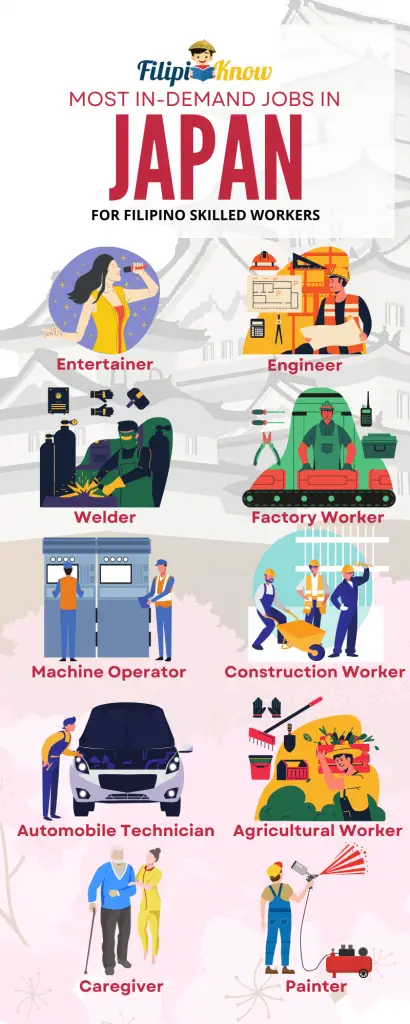
1. Entertainers/Performing Artists

Job Overview: Filipinos in entertainer occupations, such as dancers and singers, have been historically in-demand in Japan since the 1980s. While regulations have become stricter to protect Filipinos, the profession remains in high demand.
Average Salary: Singers earn JPY 3,629.51/hr while dancers earn JPY 2,370.51/hr (based on data from Salary Expert).
Requirements:
According to POEA8 and TESDA, the following are the requirements for Filipino performing artists in Japan:
- Minimum two years of education in the type of performance being hired for OR minimum two years of experience in the type of performance being hired for.
- Must be certified by TESDA (Technical Education and Skills Development Authority).
- Must have an Artist Record Book (ARB).
Job Variations: Singer, Dancer
2. Engineers
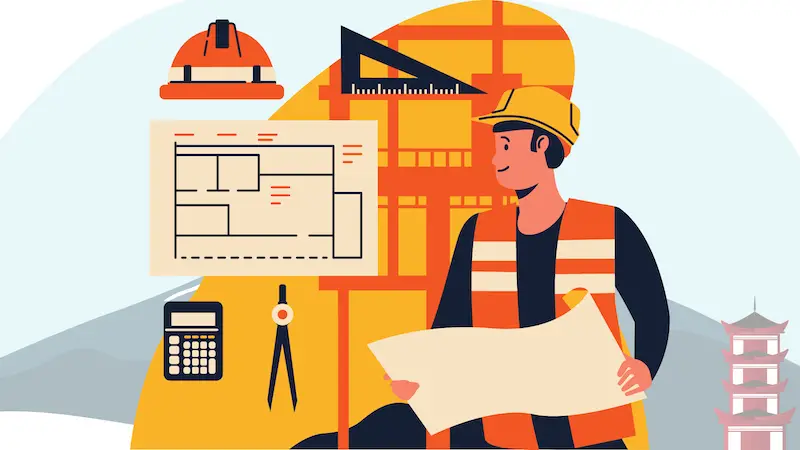
Job Overview: Many engineer vacancies are available for Filipinos who want to work in Japan. These include job orders for IT, civil, and mechanical engineers. According to Japan’s Ministry of Economy, Trade, and Industry, there is an expected 300,000 demand gap for IT engineers9 alone in 2020.
Average Salary:
- IT engineers – JPY 5,149.92/hr
- Civil engineers – JPY 4,086.40/hr
- Mechanical engineers – JPY 4,663.88/hr
Requirements10:
- Must be a graduate of a university where he/she majored in the subject related to the engineering duties he/she plans to undertake OR must have at least ten years of relevant experience.
Job Variations: Engineer Marine, Engineer Civil, Engineer Production, Engineer Quality Assurance, Mechanical Engineer, Engineer Security, Engineer Core Network, Engineer Strategic Planning
3. Welders
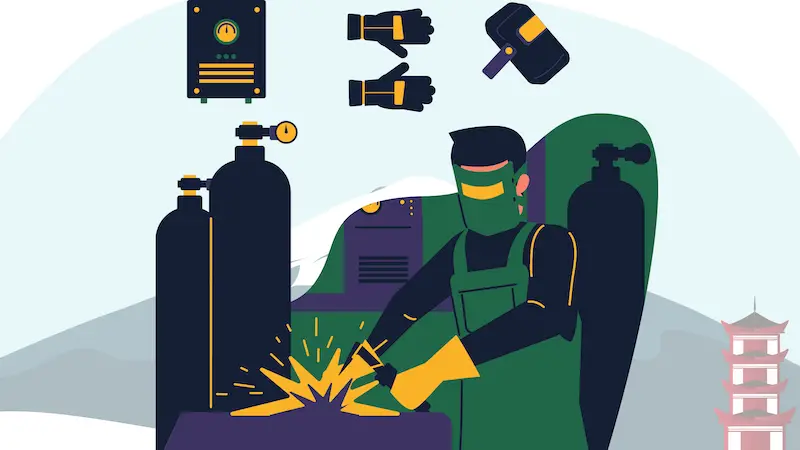
Job Overview: Using welding equipment to do their job, welders are tasked with joining metal parts together for manufacturing or construction purposes. While typically a male-oriented profession, job orders for welders in Japan are not restricted, and females can also apply. Welders may be able to find work in Japan’s construction, shipbuilding, aviation, machine parts, and tooling industries.
Average Salary: JPY 2,268.08/hr
Requirements:
- Must be certified by TESDA in welding OR must have at least ten years of relevant experience.
Job Variations: Welder Semi-Automatic, Welder Sheet Metal
4. Production Workers or Factory Workers
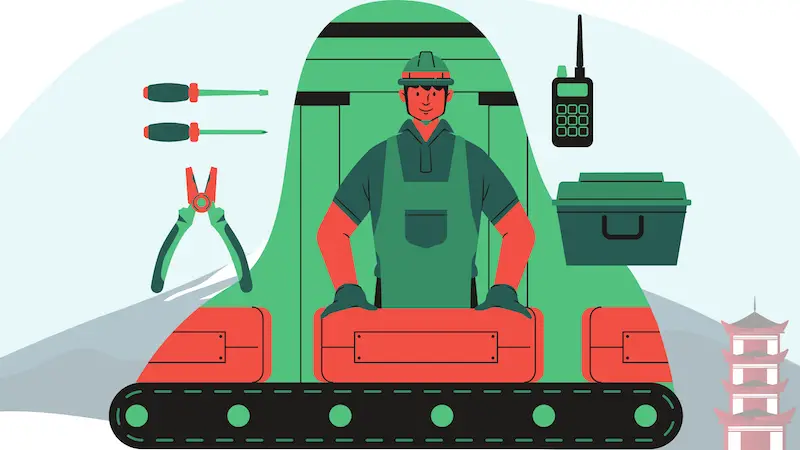
Job Overview: Factory workers handle product preparation, assembly, and packaging. In Japan, there is currently a demand for laborers in the food and electronics manufacturing industries.
Average Salary: JPY 1,364.50/hr
Requirements:
- There are no experience requirements for a factory worker. However, due to the physically demanding nature of the job, most employers will look for a physically fit person and may prefer those with a 20/20 vision.
Job Variations: Ready-Made Meal Manufacturing Worker, Manufacturer Salted Product, Packager Industrial, Processing Beef and Pork Industry, Worker Chicken Processor, Assembler Electric Equipment
5. Machinists & Machine Operators
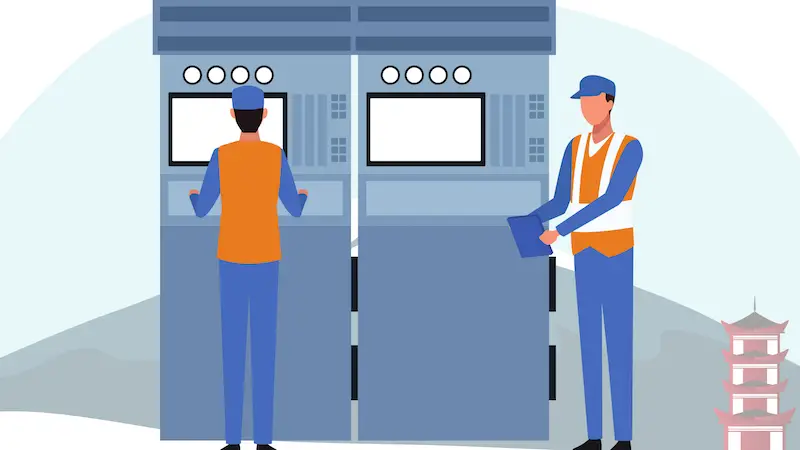
Job Overview: Machine operators and machinists operate and maintain heavy machinery in the manufacturing and construction industries. Depending on the type of machine used, the job may require the applicant also to be skilled in the setup and assembly of the equipment.
Average Salary: JPY 2,575.72/hr
Requirements:
- TESDA certification may be required depending on the machine type.
- Relevant experience may be required according to the machine type.
- Physically fit applicants are preferred.
Job Variations: Application of Construction Equipment (Excavation Work), Application of Construction Equipment (Road Rolling Work), Machinist, Operator Spinning, Operator Weaving, Operator Machine, Lathe Operator
6. Construction Workers
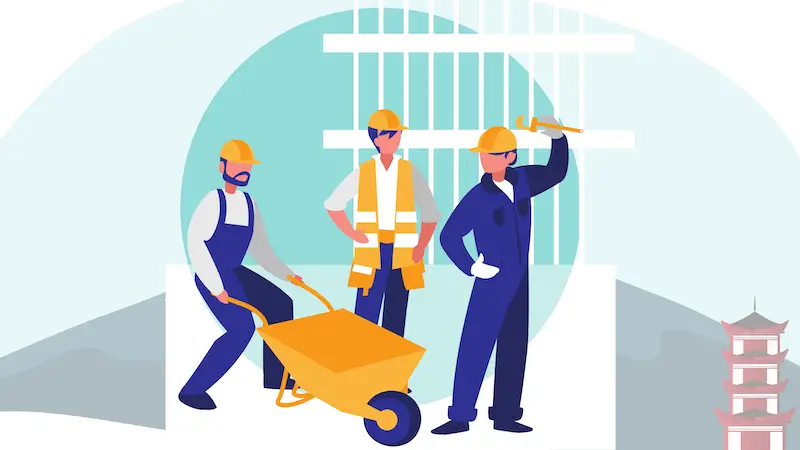
Job Overview: Construction workers do physically demanding manual labor to build residential, commercial, or industrial structures. Compared to machine operators, who typically need certification, they are less strict about the requirements for construction laborers.
Average Salary: JPY 1,945.76/hr
Requirements:
- Minimum of 1 year of experience in the related construction field.
- You must be a high school graduate.
Job Variations: Scaffolder, Reinforcing Bar Construction, Waterproofing Worker, Frame Worker, Finishing Worker
7. Automobile Technicians

Job Overview: An automobile technician must be able to do preventive maintenance and damage repair work for cars and other vehicles. Japan is home to large automotive brands like Toyota and Honda, so they are looking for foreign workers to fill the labor gap.
Average Salary: JPY 2,192.77/hr
Requirements:
- Minimum of 1 year of experience in light or heavy automobile maintenance.
- Must be a high school or college graduate.
- Employers may prefer those with experience in denting, painting, and electrical.
Job Variations: Maintenance Automobile Repair
8. Farm & Aquaculture Workers

Job Overview: Farm and aquaculture workers are manual laborers in the agricultural and fishery industries. Depending on the product of the company they enter, these laborers may do tasks such as harvesting oysters, feeding hogs, planting crops, or packaging produce.
Average Salary: JPY 952.27/hr
Requirements:
- Minimum two years of experience as a farmer in the related field.
- You must be a high school graduate.
Job Variations: Agricultural Worker, Worker Aquaculture, Agriculture Livestock, Farmer Cultivation, Raiser Hog, Upland Field Cropping, Horticulture (Agriworker), Scallop and Oyster Farming
9. Caregivers

Job Overview: Caregivers are tasked with assisting with bathing, feeding, and other personal support work. Due to an aging population, Japan has a large demand for caregivers who can take care of their elderly. With such high demand, some companies are willing to sponsor a caregiver’s Japanese language education.
Related: How To Become a Caregiver in Canada: A Definitive Guide for Filipinos
Average Salary: JPY 1,568.76/hr
Requirements:
- Must be a Bachelor of Science in Nursing Graduate (with or without a PRC license).
- Must have TESDA National Certificate II in Caregiving (NC II).
- Must undergo at least 12 months of Japanese language training (six months in the Philippines and six months in Japan).
- Must work and study to get a “Kaigofukushishi” or caregiving license while in Japan.
Job Variations: Worker Care, Caregiver
10. Painters
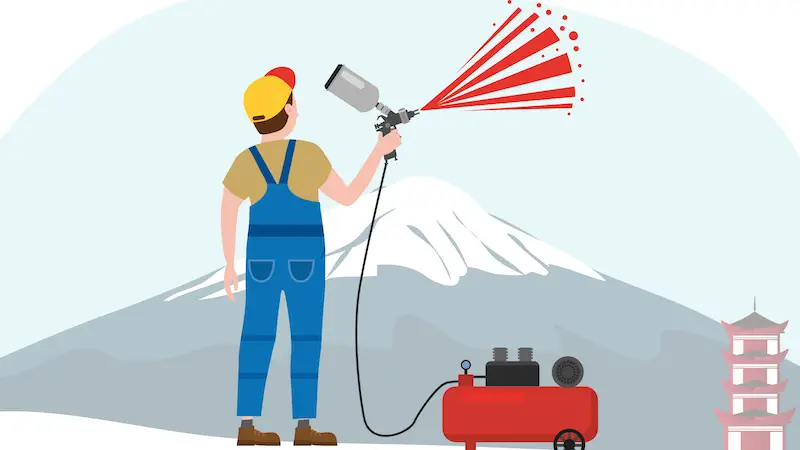
Job Overview: Painters are manual laborers who apply decorative paint finishes to wood, metal, and plastic surfaces. Depending on their painting surface, painters might be required to be skilled in the brush, spray-painting, or other tools. They are currently in demand in the construction, shipbuilding, electronics, and aviation industries.
Average Salary: JPY 2,106.69/hr
Requirements:
- Must have at least one year of painting experience.
- You must be a high school graduate.
Job Variations: Painter, Worker Painting
Working in Japan Through Direct Hire vs. POEA-Accredited Agencies
While there is currently a ban on direct hire11 for jobs in Japan, there are still some exemptions:
- Direct hire is allowed for Members of the Diplomatic Corps, International Organizations, and Heads of State and Government Officials with the rank of at least Deputy Minister.
- Established small or medium-sized companies can apply for an exemption but only for job positions that have not been newly created.
However, even if you get a direct-hire job in Japan, there is a high chance that you need to get it processed with POEA (now DMW), making it much more burdensome than applying to jobs through POEA-accredited agencies.
Thus, it’s highly recommended to go through a POEA-accredited agency not only for the protection it gives but for its expertise. They have helped many Filipinos get a job in Japan and can also help the process go smoothly for you.
How To Get a Job in Japan Through POEA-Accredited Agencies: A Step-by-Step Guide for Filipinos
1. Finding a job in the DMW database
Before beginning your search, you might consider looking for jobs supported under the Specified Skilled Worker (SSW) program. Not only will you be able to enter Japan much easier than other jobs, but a support system will also help you integrate with Japanese society. It is currently available for 14 fields:
- Nursing care
- Building cleaning management
- Machine parts & tooling industries
- Industrial machinery industry
- Electric, electronics, and information industries
- Construction industry
- Shipbuilding and ship machinery industry
- Automobile repair and maintenance
- Aviation industry
- Accommodation industry
- Agriculture
- Fishery and aquaculture industries
- Manufacture of food and beverages
- Foodservice industry
Now, to begin your search, go to DMW’s database, where you can easily see the available job orders for the country of Japan. Just leave the default search category, “Job Site,” in the drop-down box as is, input the country name (in this case, Japan) in the search box, and click the Search button to finally display the list of available job orders, specifically from Japan.
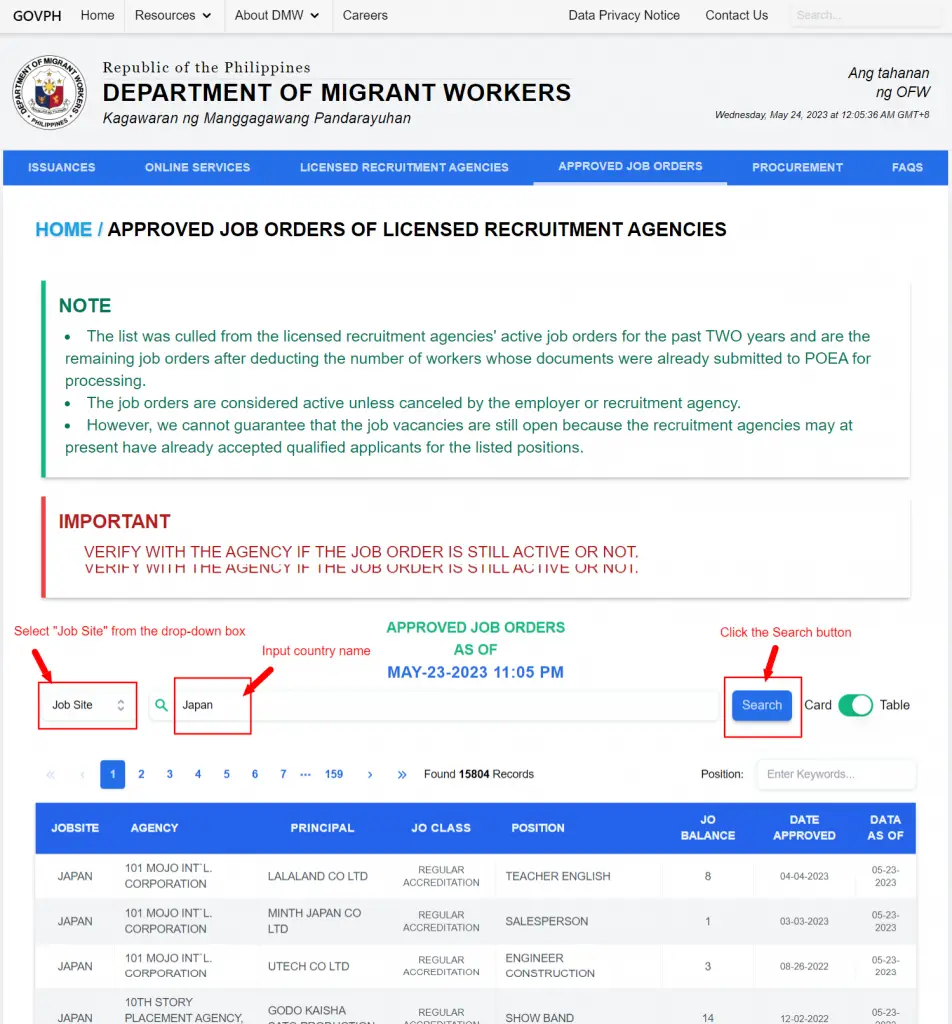
Once you decide on a job, contact the POEA-accredited agency for details. There are jobs available that require experience, but there are also jobs that don’t require it.
Most jobs available for people with no experience are those for factory workers or a laborer. The experience required for farm and aquaculture workers is on a case-to-case basis. So, you need to contact the agency regardless to confirm.
2. Getting hired for the job
As with any job, you must prepare to increase your chances of getting hired.
- Contact the agency for details on the job. These include asking what documents are needed, what tests you need to take, what training you need to undergo, and what qualifications the employer is looking for in their employee.
- Once you have this information, you must update your resume and portfolio to highlight the skills and experiences important to your employer.
- Learn about the Japanese work culture through online sources. You might need to understand Japanese work structures and etiquette to ace your interview.
- Don’t forget to practice listening to a Japanese English accent just in case the employers interview you themselves.
After adequately preparing, please submit your application to the agency and await their update.
3. Accepting a job offer
If you are successful, you’ll be able to get a job offer. Before signing anything, ensure you get all the job details–like the salary, job scope, and work conditions–in writing. Do some research before signing to make sure it’s a good offer.
The Japan External Trade Organization (JETRO) has a database of companies happy to hire highly skilled foreign professionals. If you find your company on the list, there’s a good chance it’s an excellent company for foreign workers.
This is also the time to think as deeply as possible if you will go through this. Compute your take-home pay after taxes and expenses. As yourself: Is the move to Japan worth the salary?
You might have other considerations for working in Japan, such as getting training and wanting to migrate. Don’t rush your decision but don’t be scared either. You can make the right decision if you weigh everything correctly.
4. Applying for a Japanese work visa
Filipinos who want to work and earn money in Japan must secure a work visa. There are three categories of Japanese work visas. Still, only two are available for Filipinos since the Philippines is not a part of the Working Holiday Program12. These two are:
a. The Highly Skilled Professional Visa
Introduced in 2012, this visa13 is only available for specialists in advanced academic research, specialized or technical, and business and management activities. Due to this, you’ll rarely find a job available for this kind of visa through POEA-accredited agencies.
You can’t apply for this visa without the support of a Japanese sponsoring organization. You can find more information on this at the website of the Immigration Services Agency (ISA) of Japan.
b. The Regular Work Visa
More likely than not, this is the work visa you will apply for with the help of the POEA-accredited agency. The regular work visa comes in different variations according to your job. They have separate work visas for professors, artists, entertainers, medical services, engineers, specified skilled workers, and many more. You can view the complete list on Japan’s Ministry of Foreign Affairs (MOFA) website.
Requirements may differ depending on the type of regular work visa you need. However, there are standard requirements; these include:
- Certificate of Eligibility. Your employer will be the one to get this for you from ISA
- Japan Work Visa application form (from MOFA: with QR code, without QR code)
- Valid passport plus photocopies of first information page
- Passport-size pictures
- Job offer documents, including details about your position and salary in the company
If you need other document templates for your visa application, such as an itinerary in Japan template, you can get them from MOFA’s visa page.
5. Preparing to work in Japan
Once you get your visa in order, you can prepare to move to Japan.
- Safely pack all of your documents. You’ll need your passport, work visa, job offer, and other necessary documents to enter the country. Also, as you are packing your luggage, check whether an item is prohibited or needs to be declared by visiting Japan’s customs website.
- Make sure to find a place to stay in advance. That way, once you arrive, you can immediately set up a place to call home for the next few years.
- Prepare enough cash in JPY or USD. If you can, find a way to access your money in Japan through ATMs or smartphones. If you are not under the SSW program, you might have difficulties opening a bank account there.
- Practice your English and Japanese speaking and listening skills. Both languages will be helpful, primarily if you work in a multicultural setting.
6. Arriving in Japan
After arriving in Japan, you will need to secure a few things to be able to work legally and live comfortably there. These include:
- If you enter Japan through one of the major airports (e.g., Narita, Haneda, or Kansai), you will get a landing permit and a residence card. If you didn’t enter through one of these airports, then you’ll need to apply for one through a local municipal office. Otherwise, you might be penalized.
- After 14 days, you must update your residence card with your address by visiting a local municipal office.
- It’s a good idea to learn about the transportation system options in Japan as well. Figure out how to commute from your residence to your office so you’re not late on your first day at work. You might want to do a test run as well. You might also find excellent shopping places for food, electronics, and other necessities.
- Do your research on labor laws, the local working culture, healthcare, and insurance systems in Japan. JETRO has a helpful resource on each of these topics.
- As a Filipino living in Japan, you should never fear joining local communities and organizations. You need to be the one to find a place where you will feel like you belong.
- If you hold a highly skilled professional visa, you might find the permanent residence option available. You might want to prepare for the requirements beforehand.
An Overview of Filipinos in Japan
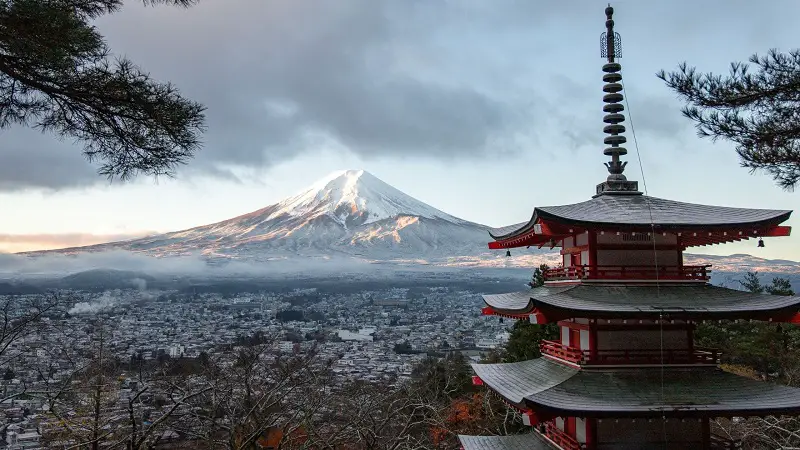
As early as the 1920s14, Filipino jazz musicians were already playing in Osaka and Kobe. From the 1950s, Filipinos grew as many male musicians were hired to play in entertainment places and US bases around Japan. But it wasn’t until the 1980s that migration to Japan really picked up.
According to data from the Commission on Filipinos Overseas (CFO), an average of 136 Filipino emigrants15 were moving to Japan annually in the early 1980s. This number ballooned to the thousands in 1989 and grew steadily until 2006, with the highest recorded number being 9,723 Filipino migrants.
While skilled Filipino professionals and blue-collar workers also migrated to Japan, the majority were Filipinas who moved to Japan with an entertainer visa. Under the guise of being hired as singers and dancers, many Filipinas worked as hostesses in ‘Philippine Pubs’16 instead. Despite the dangers, many Filipinas chose to work in these conditions to escape poverty.
In 2005, Japan became stricter in their rules for their entertainer visa, and the practice of Philippine pubs consequently declined. Since then, emigration from the Philippines to Japan has slowed down.
As of 2019, 132,551 Filipinos17 now hold permanent resident visas for Japan. A large portion of this population is former hostesses who have been able to stay in the country and integrate into Japanese society under new professions.
After introducing the Japan-Philippines Economic Partnership Agreement (JPEPA) in 2008, other professions began to thrive. Filipinas in Japan now work more varied jobs, such as English teachers, housekeepers, and caregivers.
For men, opportunities aside from being in the construction field also opened up. These include working in engineering and IT. Due to the demand for professionals in these jobs, there’s a better balance between the male and female ratio of Filipinos under 35.
Why You Might Like Working & Living in Japan
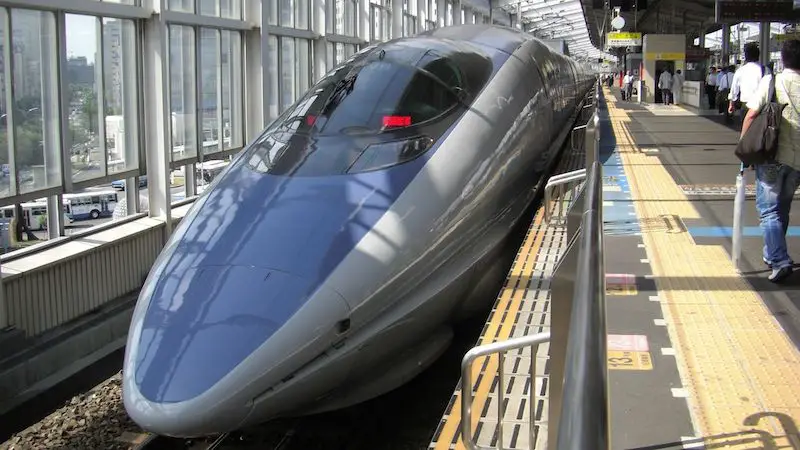
Many Filipinos are enamored with the beauty of Japan’s nature, culture, and infrastructure. Japan even ranks above average on the OECD Better Life Index18 for income and wealth, jobs and earnings, education and skills, housing, and environmental quality. Here are a few reasons why you might love working and living in Japan:
1. Support for Specified Skill Workers
Since 2019, the Ministry of Foreign Affairs of Japan has been attracting skilled foreign workers through their Specified Skilled Worker or SSW program19. Workers in these 14 industries will have access to dedicated support organizations to help them open a bank account, rent a house, or blend comfortably within Japanese society.
2. Opportunities to Learn & Improve
Due to the ‘Lifetime Employment’ practice in Japan, most Japanese companies often have a training system in place so they can build the skills of their employees on the premise that they will be working for them for life. And, as you live in Japan, you can also learn from the best practices that the Japanese people apply in their work and everyday life.
3. Better Salary & Benefits
Effective October 2021, Japan has increased the average minimum wage to JPY 930/hr or JPY 7,440 per day for an 8-hour workday20. That’s about six times the minimum wage in Manila. If you’re working in a high-demand, high-skill job, then it’s only natural for the difference to be much more significant.
Not only that, but Japanese companies also provide benefits such as:
- Company-covered health insurance and yearly health check-ups. In Japan, it’s mandatory for anyone, including non-citizens, to enroll in the national health plan21, and the company will usually cover the cost for you.
- Commuting allowance. Although not required by law, it’s become common practice for Japanese companies to pay for their employees’ commuting expenses.
- Withholding tax system. Like the Philippines, the Japanese also use a withholding tax system, so you don’t have to worry about filing your taxes since the company will do it for you.
4. Top Quality Education System
Ranked 7th in 2021 in World Population Review’s education rankings22, Japan is an excellent choice for quality education for you or your family. Japan is renowned for having an exceptional education system and having many of its universities recognized worldwide.
5. Plenty of Activities to Do
Japan has a wide variety of top-tier experiences for every type of person. If you like to explore, you can visit many picturesque landscapes and cultural landmarks around the country. If you love shopping, Japan has many large department stores housing popular brands and unique shops for various curios.
6. Sophisticated Public Transportation
Japan’s many destinations are better due to its robust and reliable public transportation system. The sheer number of train and bus routes available means you’ll have access to almost any destination you want.
Why You Might Not Like Working & Living in Japan

There are many benefits to living in Japan, but it might not be for everyone. To help you have a clear picture of what to expect, below are some reasons you might not like working in Japan.
1. High Cost of Living
Based on data from Numbeo23, the cost of living in Japan is, on average, more than double the cost of living in the Philippines. This includes expenses such as rent, food, and other necessities. When computing your take-home pay, factor in these expenses and your taxes.
2. Fewer Paid Leaves
In the Philippines, regular employees have been granted 15 vacation and 15 sick leaves annually per DOLE guidelines24. By contrast, Japan offers no sick leaves and only a total of 10 to 20 paid leaves25 (depending on tenure) per year.
3. Differences in Work Culture
When you work for a Japanese firm for the first time, you might experience some culture shock due to the different work cultures there. Here’re a few examples of what’s different in Japan compared to the Philippines:
- No work-life balance. ‘Karoshi,’ the Japanese word for death from overwork, has been a recurring problem26 in Japanese society. There is an expectation for employees to arrive early and work until late. The lack of sick leaves in Japan also doesn’t help.
- Culture of dining and drinking with coworkers and bosses. There is an unspoken rule in Japan where employees are expected to dine and drink with their peers. Not attending may make you an outsider in your company circle. Following these will also eat into your little personal time.
- Gender gap. In the 2021 Gender Gap Report27 of the World Economic Forum, Japan ranked among the lowest at 120 compared to the Philippines in rank 17. Women are, on average, paid 43.7% lower and are primarily hired as non-regular workers. There is also a distinct lack of women in senior and managerial roles – only 14.7%.
- Language and cultural barrier. Context is critical in the Japanese language. As a Filipino who is most probably a beginner in the language, it might be hard for you to join conversations with your peers.
- Inefficient working style. Japan ranks among the lowest in productivity28 among the G7 nations. When you begin work, you might encounter inefficient processes such as frequent meetings, a barrier to sharing ideas, and mandatory non-work events.
4. Dense Urban Population
You might already be used to it if you live in Manila, but cities in Japan also tend to be very crowded. When commuting to or from work during rush hour, you might find yourself sandwiched alongside many people in trains, escalators, buses, and subways.
5. Difficulty in Opening a Bank Account
If you are not under the SSW program, you might find opening a bank account in Japan difficult. Bank conditions are stringent, especially if you, as a foreign worker, do not have permanent residency status in Japan.
Tips & Warnings
- POEA (now DMW) warned 29 the public concerning the increase of social media scammers offering a job in Japan. Always be wary about any job posts that you see that aren’t from official sources. Some common signs that the job is a scam include: 1) Being asked to pay in advance, 2) The agency is not willing to disclose the details, 3) The agency does not have a valid license, 4) and there isn’t any information about the agency, employer or the job online.
- When deciding to move to Japan for a higher salary, compute the cost of living as part of your considerations. According to Numbeo, a single person’s average monthly cost of living is around JPY 119,780.01 or PHP 52,958.99. And this amount does not even include rent. Ultimately, you’ll be the one to decide if it’s worth it based on your expected salary, training, and other benefits of working in Japan.
- Don’t forget to also factor in your taxes. As a rule, the income tax paid by non-residents is the same for residents. They follow a progressive tax rate system that starts from 5% and goes up to 45%30 as the value becomes higher. Your company will be the one to pay this to the government for you but don’t forget to confirm how much your actual take-home pay will be.
Frequently Asked Questions
1. Do POEA-accredited agencies charge a placement fee for getting you a job in Japan?
There is no placement fee for people who want to work in Japan except for jobs that fall into the following categories31:
Entertainers (such as musicians and theater actors)
Models (for fashion shows, commercial modeling, and similar)
Scientists
Management Executives
Skilled Workers (passed the technical skill test provided by Article 44, paragraph 1 of Japan’s Human Resources Development Promotion Act.
Private recruitment agencies may charge a maximum of 1 month’s salary for these professions but only after earning at least 7 million yen or more in the first year since employment.
2. Do I need a work visa to apply for a job in Japan?
All foreign nationals who wish to be paid for work in Japan need a work visa. There are many different kinds of work visas32 available in Japan, depending on your profession. These include artists, professors, entertainers, nurses, and more visas. The ‘highly skilled professional visa’ is also available for experts in advanced academic research, technical or business activities.
3. How much is the minimum wage in Japan?
The national weighted average for the minimum wage in Japan is JPY 930/hr as of October 202133. However, note that the actual minimum wage may differ in each of Japan’s 47 prefectures. It can go as high as JPY 1041/hr in Tokyo and as low as JPY 820/hr in Okinawa.
4. Can I apply for a job in Japan without being skilled in the Japanese language?
Yes, you can apply for some jobs, such as welding and factory work, without being exceptionally skilled in Japanese. Some professionals, such as nurses and caregivers, are even given language training by their Japanese employers. You can ask your POEA-accredited agency if the Japanese Language Proficiency Test (JLPT) is required for the position you are applying for.
References
- Philippine Overseas Employment Administration (POEA). (2019). POEA Memorandum Circular No. 19, Series of 2019 (No Placement Fee For Workers To Be Deployed To Japan). Mandaluyong City.
- Work or Long-term stay. (2019). Retrieved 15 February 2022, from https://www.mofa.go.jp/j_info/visit/visa/long/index.html
- Philippine Overseas Labor Office, Philippine Embassy in Tokyo, Japan. (2021). POLO Advisory No. 2021-012 (Observance of the 2021 Minimum Wage Per Prefecture).
- Escalada, M. (2018). Six-Year Statistics of Filipino Residents in Japan (December 2012-December 2017) (pp. 1-2). Philippine Overseas Labor Office (POLO) in Tokyo, Japan. Retrieved from https://polotokyo.dole.gov.ph/wp-content/uploads/2018/10/6yr-Statistics-of-Filipino-Residents-in-Japan-2012-2017.pdf
- Patinio, F. (2021). Jobs available for OFWs once Japan reopens borders. Retrieved 15 February 2022, from https://www.pna.gov.ph/articles/1152546
- Lam, D. (2021). Japan’s Filipino community puts down roots and moves past its hostess origins. Retrieved 15 February 2022, from https://www.japantimes.co.jp/community/2021/01/24/issues/japans-filipino-community-puts-roots-moves-past-hostess-origins/
- Patinio, F. (2021). 350K jobs available to migrant workers in Japan. Retrieved 15 February 2022, from https://www.pna.gov.ph/articles/1148874
- Philippine Overseas Labor Office (Philippine Embassy in Tokyo, Japan). (2005). POEA Market Update (No. 7, Series of 2005): The New Japanese Immigration Requirements for Entry of Foreign Overseas Performing Artists.
- Tsuyoshi, M. (2021). Digital Shift: Japanese Recruiter Turns to India Amid IT Engineer Shortage. Retrieved 15 February 2022, from https://www.nippon.com/en/japan-topics/g01044/
- The Japan Engineer Visa. Retrieved 15 February 2022, from https://www.japanvisa.com/visas/japan-engineer-visa
- Direct Hire Exemption. Retrieved 15 February 2022, from https://polotokyo.dole.gov.ph/direct-hire-exemption/
- The Working Holiday Programmes in Japan. (2020). Retrieved 15 February 2022, from https://www.mofa.go.jp/j_info/visit/w_holiday/index.html
- Highly skilled professional visa. (2023). Retrieved from https://www.mofa.go.jp/j_info/visit/visa/long/visa16.html
- Plantilla, J. (2017). Filipinos in Kansai: Living Within Japanese Society. Focus Asia-Pacific, 2. Retrieved from https://www.hurights.or.jp/archives/focus/section1/Focus%2090.pdf
- Did You Know? – Japan is the Top 3 Country of Destination Among Filipino Emigrants in 1981-2018. Retrieved 15 February 2022, from https://cfo.gov.ph/did-you-know-japan-is-the-top-3country-of-destination-among-filipino-eemigrants-in-1981-2018/
- Kōshō, N. (2018). Fake Marriages and Filipina Hostesses in Japan. Retrieved 15 February 2022, from https://www.nippon.com/en/column/g00505/
- Some 132,000 Filipinos call Japan home, years after arriving to work at pubs. (2021). Retrieved 15 February 2022, from https://www.scmp.com/news/asia/east-asia/article/3119012/some-132000-filipinos-call-japan-home-years-after-arriving-work
- Japan. Retrieved 15 February 2022, from https://www.oecdbetterlifeindex.org/countries/japan/
- What is the SSW ?. Retrieved 15 February 2022, from https://www.mofa.go.jp/mofaj/ca/fna/ssw/us/overview/
- Japan’s average minimum hourly wage to rise to 930 yen. (2021). Retrieved 15 February 2022, from https://the-japan-news.com/news/article/0007672187
- Health Insurance System. (n.d.). Retrieved from https://japanhpn.org/en/hs1/
- Education Rankings by Country 2022. (2022). Retrieved 15 February 2022, from https://worldpopulationreview.com/country-rankings/education-rankings-by-country
- Cost of Living in Japan. (2022). Retrieved 15 February 2022, from https://www.numbeo.com/cost-of-living/country_result.jsp?country=Japan
- Department of Labor and Employment (DOLE). (2013). Employee Guidebook [Ebook]. Retrieved from https://www.dole.gov.ph/wp-content/uploads/2019/04/Employee-Guidebook-as-of-2013-10-07.pdf
- Labour Standards Department, Osaka Labor Bureau. Encouraging Workers to Take Annual Paid Leave. Retrieved from https://jsite.mhlw.go.jp/osaka-roudoukyoku/library/osaka-roudoukyoku/doc/foreign/pdf/yukyu_english.pdf
- White, S. (2016). Death by overwork on rise among Japan’s vulnerable workers. Retrieved from https://www.reuters.com/article/us-japan-economy-overwork-idUSKCN0X000F
- (2021). Global Gender Gap Report. Geneva, Switzerland: World Economic Forum. Retrieved from https://www3.weforum.org/docs/WEF_GGGR_2021.pdf
- Japan’s Productivity Ranks Lowest Among G7 Nations for 50 Straight Years. (2022). Retrieved from https://www.nippon.com/en/japan-data/h01196/
- Patinio, F. (2021c). Public warned vs. social media scammers offering jobs in Japan. Retrieved from https://www.pna.gov.ph/articles/1150009
- Taxes in Japan. (n.d.). Retrieved from https://www.jetro.go.jp/en/invest/setting_up/section3/page7.html
- Philippine Overseas Employment Administration (POEA). (2019). POEA Memorandum Circular No. 19, Series of 2019 (No Placement Fee For Workers To Be Deployed To Japan). Mandaluyong City.
- Work or Long-term stay. (2019). Retrieved 15 February 2022, from https://www.mofa.go.jp/j_info/visit/visa/long/index.html
- Philippine Overseas Labor Office, Philippine Embassy in Tokyo, Japan. (2021). POLO Advisory No. 2021-012 (Observance of the 2021 Minimum Wage Per Prefecture).
Rod Michael Perez
Rod Michael Perez is a freelance writer with over 7 years of experience in writing long-form articles, ad copy, and SEO content for local and foreign clients. He is also an aspiring startup founder and believes that the Philippines could be the next hub for startup culture. He takes care of his dog, a poodle-Shih Tzu hybrid, in his spare time.
Copyright Notice
All materials contained on this site are protected by the Republic of the Philippines copyright law and may not be reproduced, distributed, transmitted, displayed, published, or broadcast without the prior written permission of filipiknow.net or in the case of third party materials, the owner of that content. You may not alter or remove any trademark, copyright, or other notice from copies of the content. Be warned that we have already reported and helped terminate several websites and YouTube channels for blatantly stealing our content. If you wish to use filipiknow.net content for commercial purposes, such as for content syndication, etc., please contact us at legal(at)filipiknow(dot)net